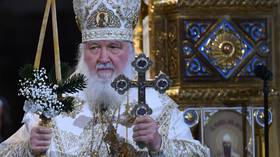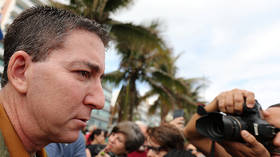Putin takes a plunge: Russian president among thousands of Orthodox Christians braving icy dip in freezing waters to mark Epiphany
Across Russia and much of Eastern Europe, Orthodox believers submerged themselves in sub-zero temperatures on Tuesday to mark Epiphany, which commemorates the baptism of Jesus in the River Jordan.
While some Russian regions have temporarily banned the ritual, which sees worshippers throwing themselves into barrels, pools and holes cut in icy lakes or rivers, over coronavirus fears, most have made exceptions for the mass gatherings. In Moscow, for example, more than 220 bathing spots were prepared, with around 10,000 car parking spaces set up to allow visitors easy access. Temperatures in the capital have been around -12 degrees Celsius (10 degrees Fahrenheit) or even colder.
Russian President Vladimir Putin was among those observing the chilly ritual. His spokesman, Dmitry Peskov, told journalists that “he usually does it. And he doesn’t change his traditions.” However, last year Putin was attending a conference in Berlin over the Epiphany, and whether he managed to break away for a dip in the Spree, which runs through the German capital, was not disclosed.
The practice is thought to date back to ancient times, with the first instances of ice bathing recorded as early as 1525. However, its association with Epiphany is more recent, and it was observed by relatively few Russians prior to the 1917 Revolution. It became even less popular in the Soviet era, when outward signs of devotion were restricted. Since the breakup of the USSR, however, the ritual has experienced a resurgence. While some believe that the practice can cleanse people of their sins, the position is not endorsed by Russia’s Orthodox Church.
This year, clergymen have gone even further to distance the Church from ice bathing. While many bathers receive blessings from priests, a spokesman for the Orthodox Church told a Moscow radio station on Tuesday that it was far from a necessary observance for Christians. “Bathing is, in general, a marginal custom,” he said. “Bathe, do not bathe, if you believe in God, then just be a Christian – pray, go to church as much as possible in the conditions of the pandemic.”
If you like this story, share it with a friend!















